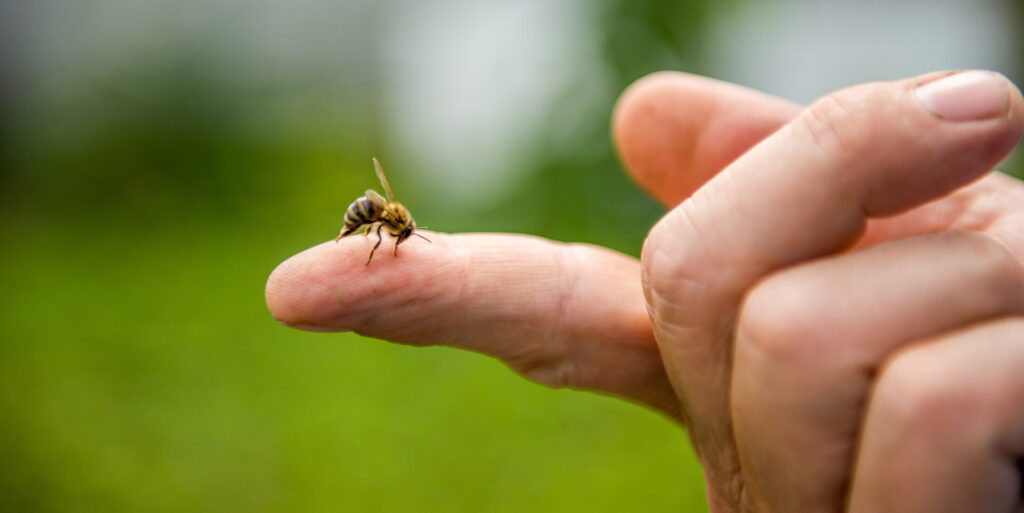Allergy season is in full swing here in Georgia. Now that we’re experiencing warmer weather and all the beauty that comes with it, we’re also experiencing higher numbers of stinging/biting insects and more pollen from grasses, trees, flowers, and other plants.
To protect yourself from allergic reactions all season long, discover the two most common types of allergens you’re likely to encounter in the great outdoors and what you can do to avoid them.
Pollen
The most common airborne allergen is the dreaded pollen. Impossible to avoid from about March to September, pollen is a fine powder released by many plants, including:
- Trees
- Grasses
- Weeds
When pollen is released, it travels mostly by wind and lands just about everywhere—sidewalks, driveways, streets, cars, even on you if you’re outside for long enough.
When Is Pollen Season?
Pollen season ranges from about March to September, with two windows of high pollen counts: March to May and early August to late September.
The most severe season for a pollen allergy is spring, when the pollen-producing plants wake back up from winter dormancy and start to bloom. In Georgia, our warmer climate causes plants to begin blooming earlier and for longer, lengthening the time we have to deal with the initial influx of pollen.
Once the initial wave of pollen ends, next comes the release of grass pollen in June and July. Then, around early August, ragweed releases pollen, further agitating those with a pollen allergy.
Symptoms of a Pollen Allergy
Pollen allergies are frustrating and can lead to symptoms that include:
- Congestion
- Excessive coughing
- Excessive sneezing
- Eye irritation
- Itchy throat
- Runny nose
- Watery eyes
- Wheezing
Pollen and Hay Fever
Some patients experience chronic symptoms of a pollen allergy and feel as if they are fighting a cold all season long. This is what’s known as hay fever. Patients with hay fever often have chronic or prolonged allergy symptoms that include:
- Nasal congestion
- Sore throat
- Watery eyes
- Congestion
While patients with a typical pollen allergy stop having allergic reactions once they are no longer exposed to the allergen, hay fever patients can continue having symptoms even when pollen is no longer present.
How to Avoid Pollen
Unless you are able to stay indoors with all windows and doors shut from the start of spring until early fall, you are probably going to encounter pollen to some extent. Avoiding pollen is practically impossible. However, there are ways to reduce exposure and lessen allergic reactions.
- Keep windows and doors shut throughout spring and summer.
- Dust and vacuum frequently.
- Avoid outdoor tasks like mowing the lawn or gardening.
- Stay indoors, especially in the mornings and evenings when pollen counts are at their highest.
Stinging and Biting Insects

Most bugs thrive in spring, summer, and fall. Once temperatures warm back up, the insects come out and stay out.
Stinging and biting insects like bees, wasps, hornets, and ants all pose a threat to everyone, especially those with an insect allergy.
Symptoms of an Insect Allergy
It’s normal to experience pain, swelling, and redness at the site of a bee sting or an ant bite. However, those with an allergy to the stings or bites of an insect can experience moderate to severe allergic reactions that include:
Moderate Reaction
- Welting at the bite or sting site
- Itching or burning at the site
- Redness and swelling that may spread out about an inch or two in radius from the welt
- Swelling and pain that lasts between five and ten days following the bite or sting
Severe Reaction
Severe reactions include all the symptoms of a moderate reaction, along with:
- Clamminess
- Dizziness
- Hives
- Increased heart rate
- Loss of consciousness
- Nausea
- Swelling in the lips, tongue, and throat
- Wheezing
These are symptoms of anaphylaxis, a serious condition that could be life-threatening if not treated quickly enough. If you or someone you know experiences anaphylaxis, seek medical attention immediately and apply an epinephrine shot like an EpiPen as directed if one is available.
How to Avoid Stinging or Biting Insects
Fire ants, bees, wasps, and hornets are practically everywhere through spring, summer, and fall. It can be challenging to avoid a stinging or biting insect. Still, there are ways to reduce your chances of encountering one or getting stung or bit:
- Wear light, long-sleeved shirts and full-length pants when outside.
- Avoid wearing fragrances, especially fruity or floral fragrances.
- Avoid open trash cans where wasps like to explore.
- Wear shoes that cover your whole foot, and be careful where you step.
- Avoid wooded areas, shrubs, and tall grasses.
- If a bee or wasp flies around you, remain still.
- If there are several bees or wasps in an area, avoid that area as much as possible.
If you have outdoor allergies to pollen and insect stings or bites, talk to the Langford Allergy team.
Dr. Langford and our team treat all allergies and allergy symptoms, including outdoor allergies. We perform thorough testing to determine which types of pollen or insects you are allergic to. We also offer treatments, medications, and education on protecting yourself while exploring the great outdoors.
Schedule an allergy test with our team today: 478-787-4728
Langford Allergy delivers allergy, asthma, and immune deficiency care to patients throughout Middle Georgia, including:
- Macon, GA
- Warner Robins, GA
- Milledgeville, GA
- Forsyth, GA
Related articles:
How to Reduce Allergens in Your Home This Summer
Which Insects Are Most Likely to Trigger an Insect Allergy?
